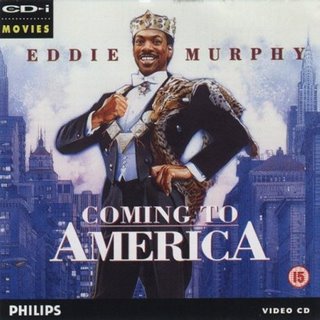 Starring:
Starring:Eddie Murphy
Arsenio Hall
James Earl Jones
Standard formula for making a romantic comedy: Guy meets girl. Girl, initially, doesn’t want guy. Girl is involved with villain boyfriend. Guy persists. Girl sees villain boyfriend for what he is. Girl falls for guy. Guy blows it. Girl leaves. Guy chases after girl. Guy begs for forgiveness. Girl eventually accepts. They live happily ever after. Roll credits.
Coming to America starring Eddie Murphy, James Earl Jones and Arsenio Hall (remember him?) follows the above formula religiously. What makes the movie so good is not the story, but watching Eddie Murphy, a brilliant comedic talent, working in his prime, before such family-film atrocities as Daddy Day Care tainted his career.
Murphy plays multiple roles in this film—a wisecracking barber, the lead singer of “Sexual Chocolate,” and Saul, a customer at the barbershop—but mainly as Akeem, the crown prince of Zarundi, who has come to America with his prim servant Semi (Arsenio Hall) to find his bride, appropriately enough in Queens, New York. However, his father, King Joffi Jafar (James Earl Jones), thinks Akeem is going to America, merely “to sow his royal oats,” and that upon his return to Zarundi, he will marry his prearranged wife.
But, while attending a black awareness rally, he sees Lisa McDowell. It’s love at first sight. Aw. So begins the pursuit of the girl. Right on cue. He gets a job at her father’s fast food joint, McDowell’s, where she works in the office. He sends her earrings as an “admirer not Daryl,” which is the name of Lisa’s villain boyfriend. Taking the advice of the old coots at the barbershop, he tries to get in good with Lisa’s father. Though, when Akeem foils a hold-up at McDowell’s, gentlemanly beating the snot out of a robber played by Samuel L. Jackson. With his foot in the door, Akeem’s down-to-earth goodness and his inherent kindness, win over Lisa. Then, after the two overcome the standard obstacles—jealous boyfriend, disapproving father (on both sides), and their own hang-ups towards their hearts’ true wishes—they marry.
Coming to America, though, is far richer than the synopsis above suggests. It’s the comic subtleties that win me over in the film. For example, Daryl, the boyfriend, is the heir to Soul-Glo jerry-curl gel, and when he and his parents stand up from the couch, there are big grease stains behind where each of their heads were. Also, any scene with the in the barbershop, had he doubled-over in laughter—the inane arguments; the relentless name-calling; the absurd I-caught-a-fish-this-big stories, and so many others to cumbersome to list.
The verdict: If you haven’t seen it, watch it. If you have seen it, you probably saw it when you weren’t old enough to get all the jokes, or you saw the censored TV version. So watch it again.
Peace out…yo.
